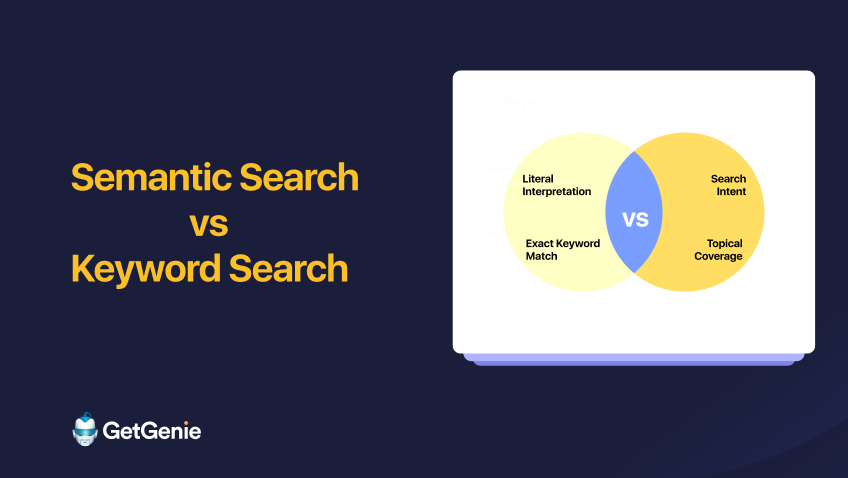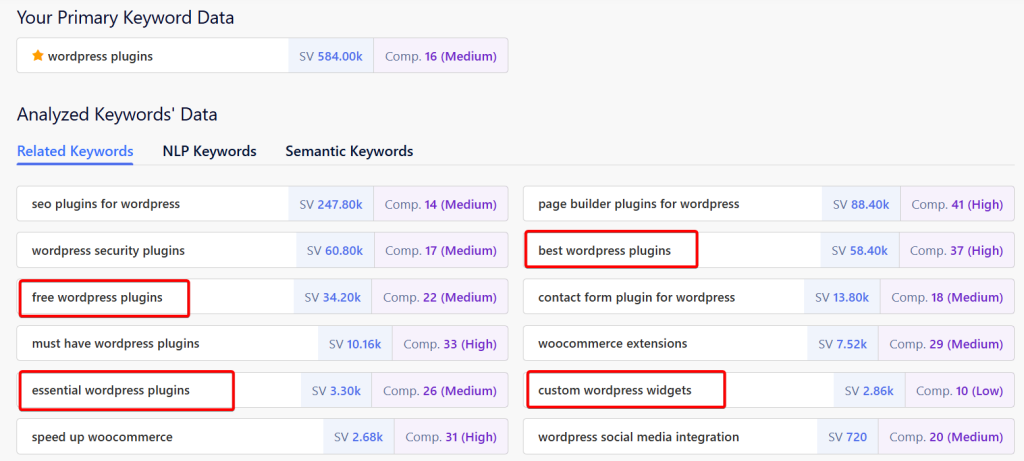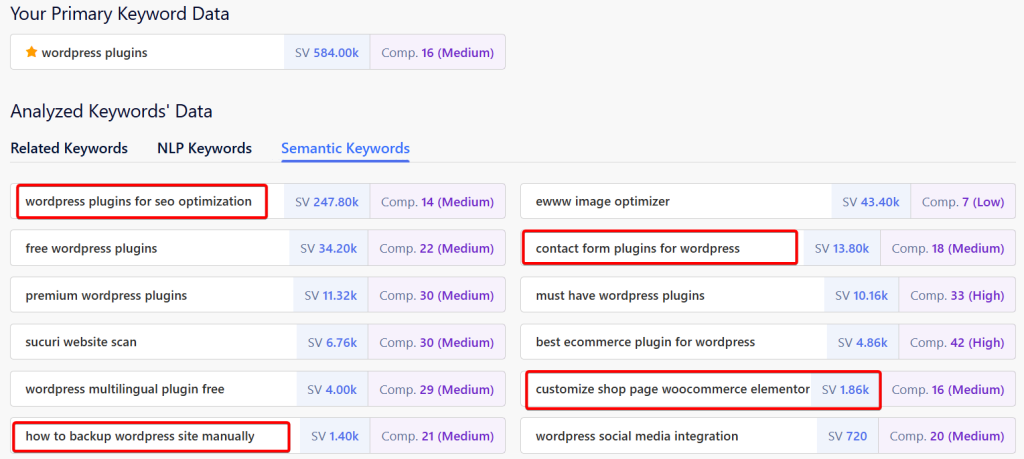Semantic Search vs Keyword Search: Which is Better to Rank Higher

Lately, I was optimizing a content piece with exact keywords, word for word, trying to rank higher for these keywords. But I quickly realized that despite tapping into all the right keywords, my page wasn’t fully connecting with what users actually wanted.
That’s when I began exploring semantic search, trying to understand why people search and the context behind their queries.
This shift clarified to me how keyword search and semantic search each have their own place. And how blending both approaches can contribute to creating better content & aligning with real user intent.
In this write-up, I will compare both semantic search and keyword search from multiple perspectives and help you decide which approach can generate better organic performance for your business. So, it’s semantic search vs keyword search.
Semantic search focuses on intent and context. Keyword search relies on exact matches.
AI and NLP enable semantic search to understand meaning, related terms, and user intent. Keyword research remains vital for high-value keywords.
Tools like GetGenie make it easier to optimize for both semantic and keyword searches. Combining keywords with semantic optimization improves relevance, user experience, and SERP rankings.
- Comparison between Semantic Search and Keyword Search
- Understanding Keyword Search
- Understanding Semantic Search
- Why Keyword Search Still Matters
- Why Semantic Search is Essential for Modern SEO
- Semantic Search vs Keyword Search
- Real-Life Examples of Semantic Search in Action
- How to Balance Keyword Research with Semantic Search
- The Future of Search: Think Human + AI
- Final Takeaway
Comparison between Semantic Search and Keyword Search
| Semantic Search | Keyword Search |
| Focuses on understanding meaning and intent behind queries | Focuses on matching exact keywords in content |
| Uses AI and NLP to interpret context and relationships | Leverages basic keyword-matching algorithms |
| Prioritizes user intent and topic relevance | Prioritizes keyword density and exact phrases |
| Provides more accurate, context-aware results | May deliver less relevant results if phrasing differs |
| Recommends natural, people-first content | Suggests keyword-rich or formulaic content |
Understanding Keyword Search
Keyword search starts by identifying the exact terms your audience uses in their search queries. It also focuses on how often and where these terms show up in content. Before 2012, it was Google’s go-to approach to rank webpages.
Let’s say your users search with the keyword “Elementor Addons” and your content contains this exact keyword. When Google crawls your page, it will detect the keyword and may rank your content higher for the search (Depending on other SEO factors).
With tools like Googleサーチコンソール, SEMrush, and GetGenie, you can discover exact keywords and analyze their performance.
Understanding Semantic Search
With breakthroughs in AI and natural language processing (NLP), semantic search helps grasp the underlying intent and meaning behind every query.
Instead of just scanning for exact words, semantic search interprets context and user intent. In other words, it reads between the lines to deliver more relevant results.
Suppose your users search with the keyword “make my website look better.” Even if your content doesn’t use that exact phrase but includes related terms like “improve website design,” “modern website layout,” or “enhance user interface,” Google can still understand the context of your content, thanks to semantic search.
However, to rank higher, your content must genuinely help users by offering effective tips, visual examples, data-driven insights, and actionable steps.
With tools like ゲットジーニー & MarketMuse, you can find semantically related terms, understand content gaps, and optimize for better topical relevance, not just keywords.
Why Keyword Search Still Matters
Despite the rise of semantic search, keyword search is far from dead. In fact, it’s a crucial part of a good SEO strategy.
Users still search with various keywords when they look up something on Google. For instance, if a user wants to buy a budget-friendly DSLR, “Best DSLR under 500” can be a keyword they will use.
Understanding this type of keyword helps you align your content with user intent and capture search traffic effectively.
Why Semantic Search is Essential for Modern SEO
Semantic search ensures that content is not just keyword-rich but also relevant, helpful, and aligned with the user’s search intent.
This allows your content to appear for a broader range of queries, even if the exact keywords don’t match.
In semantic search, when you cover a topic thoroughly using related terms, synonyms, and contextually relevant concepts, Google rates your content as authoritative. This helps your site rank better for entire topic clusters, not just one keyword.
Let’s say someone searches with the query “Best phone for photography.” Google with semantic search understands it like this: “Best phone for photography” means “smartphone with a high-quality camera」
It will consider semantic terms like camera quality, megapixels, low-light performance, zoom lens, portrait mode、など。
と NLP and AI, for this query, Google understands that the user wants recommendations of camera-focused smartphones, not just any phone list.
So, currently it shows results like:
- “Best Camera Phones 2025”
- “I’ve tested all the best camera phones of 2025”
- “Smartphones Camera Reviews”
Semantic Search vs Keyword Search
With keyword search, you will understand what exactly to cover in a content piece. And semantic search will give you an idea of how to extend each search query to satisfy the search intent.
Keywords Help Bridge Semantic Gaps
Keywords guide the topical structure of your content. With keywords, you can create content clusters, build topical authority, and map content to buyer intent. They act as a roadmap for both users and search engines to interpret your content accurately.
Apart from organic SEO, keywords also contribute to building some other digital strategies, including content calendars and paid ads. Without keyword insights, you are likely to miss crucial points on a particular topic.
And the good thing is that ゲットジーニー shows high-impact related keywords, so you can pick relevant ones to optimize your content, build content topics, and more.
I used GetGenie to discover the related or secondary keywords of the keyword “WordPress Plugins”. And it gave me some helpful related keywords to optimize in my content. These keywords have good to high search demands and helped me drive qualified traffic to my website.

Semantic Search Helps Rank for Natural Queries
Additionally, semantic search makes it easier to rank for conversational queries. For instance, queries from voice search or long-tail keywords. This brings more qualified and low-competition traffic to your site.
In a nutshell, by focusing on meaning rather than exact-match keywords, your content becomes more readable, valuable, and aligned with user expectations. This enhances site ranking & organic visits, improves time-on-site, and reduces bounce rate.
Good for you is that GetGenie also comes in handy for semantic search. The AI SEO tool displays high-intent NLP & semantic keywords based on your main input keywords.
GetGenie also provided me with impactful semantic keywords for the same keyword. These keywords helped me enhance my topical coverage, add content depth, & satisfy user search intent.

These keywords contain context & user intent. By optimizing your content with the relevant keywords, your chances of ranking will increase.
Contextual Relevance vs Literal Relevance
One of the biggest limitations of keyword search is its dependence on literal relevance. It only matches the exact words in a query. This often frustrates users because search engines may miss results that are relevant in meaning but not in wording.
For instance, if someone searches for “how to fix a slow laptop,” a keyword-based engine might ignore content titled “speed up your computer,” even though it solves the same problem.
Semantic search fixes this by understanding contextual relevance. It interprets the intent behind the query. Using NLP and entity recognition, it knows “laptop” and “computer” are related and that “slow” implies a performance issue.
As a result, users get more accurate, context-aware answers instead of rigid keyword matches. This reduces frustration, helps find solutions faster, and delivers search results that truly meet user needs.
User Experience and Search Accuracy
Keyword-based search often leads to irrelevant or repetitive results. This pushes users to tweak their queries multiple times to find the right answer. It’s an inefficient experience, especially for longer or more conversational searches.
Take this keyword, for instance, “Best tools to grow a YouTube channel fast.” Traditional search might focus only on “tools” or “YouTube,” missing the real intent, “discovering growth solutions”.
Semantic search dramatically enhances both user experience and search accuracy by analyzing the query holistically. It understands “grow a YouTube channel” as an intent-driven goal and identifies related concepts like video SEO, analytics, and audience engagement.
The results are more precise and helpful. In semantic SEO, like “Top YouTube Growth Tools in 2025” or “How to Boost Channel Subscribers Fast.”
This means fewer wasted clicks, more relevant outcomes, and a smoother journey from question to solution. That’s exactly what users expect from modern search engines.
Real-Life Examples of Semantic Search in Action
Let’s skip the theory for a second and look at how this works on Google today.
1. Google’s Knowledge Graph
Those detailed info boxes you see when searching for people, places, or things? That’s the Knowledge Graph at work.
検索する “Matt Mullenweg”, the Founder & CEO of Automattic. Google won’t just list a website, it will give you his bio, his organization names, and even related other founders. It understands the entity and its connections.
2. AI Overviews/Featured Snippets
Ask Google a question like “What is semantic SEO?” and you’ll probably get a clear answer at the very top of the page.
That’s either an AI overview or ある 注目のスニペット for your query, pulled from a relevant webpage using semantic cues. No exact-match keyword stuffing is required.
3. People Also Ask (PAA)
Search for almost anything, and you’ll see that expandable list of related questions.
Those aren’t random. Google’s anticipating your follow-ups based on semantic understanding. It’s connecting the dots between your query and the larger topic cluster.
How to Balance Keyword Research with Semantic Search
So should you ditch keywords? Definitely not. Instead, combine both approaches to build a stronger SEO strategy:
1. Start with Traditional Keyword Research
Find high-value keywords using tools like ゲットジーニー, Ahrefs, or SEMrush. Pay attention to search volume, keyword difficulty, and user intent.
2. Expand into Semantic Territory
For each keyword, think about related phrases, synonyms, long-tail variations, and questions people ask around the topic.
For the keyword “content optimization”, semantic variations could include:
- “How to improve content quality”
- “SEO content tips”
- “On-page SEO checklist”
3. Optimize Content for Meaning, Not Just Match
Forget robotic writing. Instead, use natural language and real-world examples, and structure your content clearly (Headings, bullets, & short paragraphs).
Also, answer related questions throughout the article and add schema markup to help search engines interpret your content.
The Future of Search: Think Human + AI
The way you search is changing over time. Whether text, image, or voice, each medium is shifting.
Voice Search
“Hey Google, best coffee shops near me.”
Optimizing for voice means focusing on conversational queries and local SEO.
Visual Search
Tools like Google Lens and Pinterest let users search by image. That makes alt text, file names, and visual relevance more important than ever.
Personalized Search
Search results now vary based on users’ locations, behavior, and interests. Your content needs to feel personal and relevant, not generic.
Final Takeaway
Old-school keyword search gave us the “what.” Semantic search gives us the “why.” To win in modern SEO, both keyword search & semantic search carry weight.
To strike a balance between the two, I would suggest creating content that answers deeper questions, analyzing high-intent keywords, and focusing on themes, topics, and intent.
And guess what? GetGenie can be your ultimate solution to handle both semantic search and keyword search.

